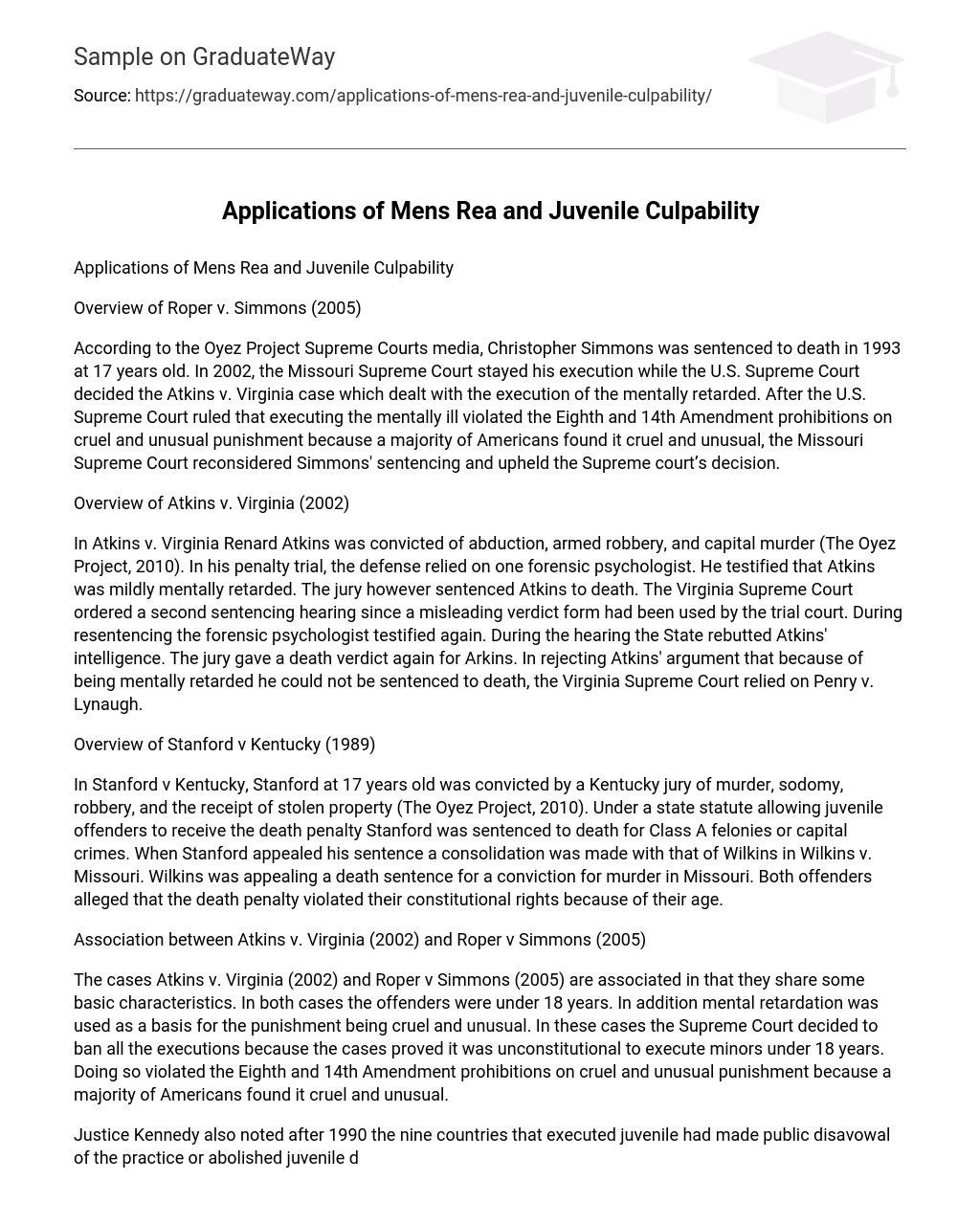Overview of Roper v. Simmons (2005)
According to the Oyez Project Supreme Courts media, Christopher Simmons was sentenced to death in 1993 at 17 years old. In 2002, the Missouri Supreme Court stayed his execution while the U.S. Supreme Court decided the Atkins v. Virginia case which dealt with the execution of the mentally retarded. After the U.S. Supreme Court ruled that executing the mentally ill violated the Eighth and 14th Amendment prohibitions on cruel and unusual punishment because a majority of Americans found it cruel and unusual, the Missouri Supreme Court reconsidered Simmons’ sentencing and upheld the Supreme court’s decision.
Overview of Atkins v. Virginia (2002)
In Atkins v. Virginia Renard Atkins was convicted of abduction, armed robbery, and capital murder (The Oyez Project, 2010). In his penalty trial, the defense relied on one forensic psychologist. He testified that Atkins was mildly mentally retarded. The jury however sentenced Atkins to death. The Virginia Supreme Court ordered a second sentencing hearing since a misleading verdict form had been used by the trial court. During resentencing the forensic psychologist testified again. During the hearing the State rebutted Atkins’ intelligence. The jury gave a death verdict again for Arkins. In rejecting Atkins’ argument that because of being mentally retarded he could not be sentenced to death, the Virginia Supreme Court relied on Penry v. Lynaugh.
Overview of Stanford v Kentucky (1989)
In Stanford v Kentucky, Stanford at 17 years old was convicted by a Kentucky jury of murder, sodomy, robbery, and the receipt of stolen property (The Oyez Project, 2010). Under a state statute allowing juvenile offenders to receive the death penalty Stanford was sentenced to death for Class A felonies or capital crimes. When Stanford appealed his sentence a consolidation was made with that of Wilkins in Wilkins v. Missouri. Wilkins was appealing a death sentence for a conviction for murder in Missouri. Both offenders alleged that the death penalty violated their constitutional rights because of their age.
Association between Atkins v. Virginia (2002) and Roper v Simmons (2005)
The cases Atkins v. Virginia (2002) and Roper v Simmons (2005) are associated in that they share some basic characteristics. In both cases the offenders were under 18 years. In addition mental retardation was used as a basis for the punishment being cruel and unusual. In these cases the Supreme Court decided to ban all the executions because the cases proved it was unconstitutional to execute minors under 18 years. Doing so violated the Eighth and 14th Amendment prohibitions on cruel and unusual punishment because a majority of Americans found it cruel and unusual.
Justice Kennedy also noted after 1990 the nine countries that executed juvenile had made public disavowal of the practice or abolished juvenile death penalty. This left the United States alone in the practice. Socially, executing juvenile was becoming unacceptable. In making the ban, the Supreme Court was also relying on scientific and sociological research that showed that juvenile lack the capacity to act responsibly due to their impulsiveness and lack of maturity. In statistics the juvenile have been shown to exhibit reckless behavior more than adults. . This places them in a situation that they can not be held accountable to the same degree as adults. Juvenile are also prone to peer pressure and thus can not avoid criminogenic setting (Steinberg and Scott, 2003).
Conclusion
The Supreme Court according to its rulings has demonstrated that the execution of juvenile violates their constitutional right. Scientific research has also made it clear that juveniles are not capable of making mature decisions that can allow them to be held culpable to their actions up to a death sentence. It is for this reason that the justice system has reached its decision.
References
Steinberg, L. and Scott, E. S (2003). “Less Guilty by Reason of Adolescence:
Developmental Immaturity, Diminished Responsibility, and the Juvenile Death Penalty”, American Psychologist 58 (12): 1009–1018.
The Oyez Project, Stanford v. Kentucky , 492 U.S. 361 (1989). Retrieved 5 Aug 2010,
from, http://oyez.org/cases/1980-1989/1988/1988_87_5765.
The Oyez Project, Atkins v. Virginia , 536 U.S. 304 (2002). Retrieved on 5 Aug 2010,
from http://oyez.org/cases/2000-2009/2001/2001_00_8452
The Oyez Project, Roper v. Simmons , 543 U.S. 551 (2005). Retrieved on 5 Aug 2010,
from http://oyez.org/cases/2000-2009/2004/2004_03_633
;





